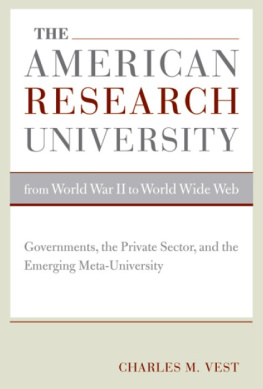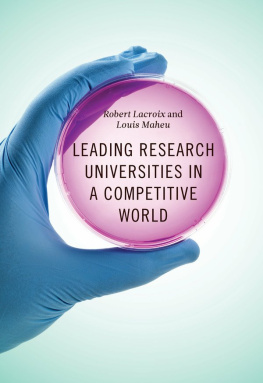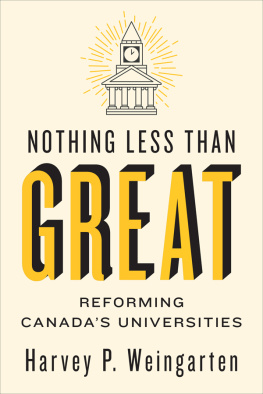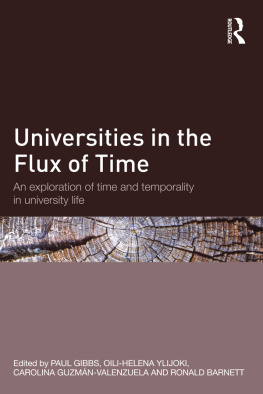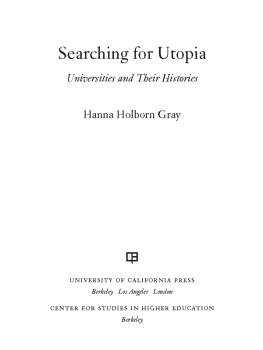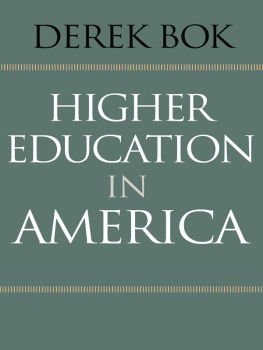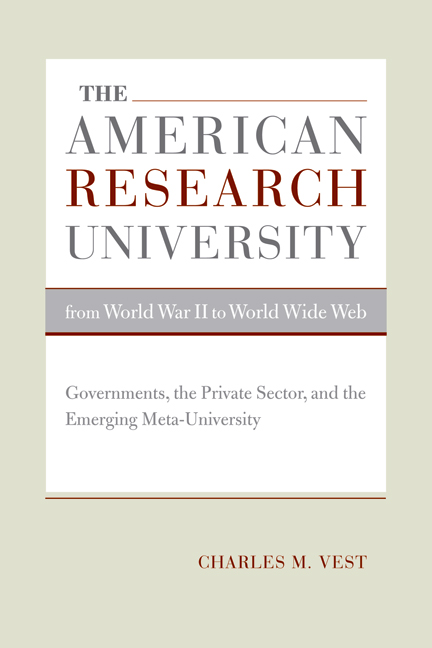Governments, the Private Sector, and the Emerging Meta-University
Charles M. Vest

UNIVERSITY OF CALIFORNIA PRESS
Berkeley Los Angeles London
CENTER FOR STUDIES IN HIGHER EDUCATION
Berkeley
The Center for Studies in Higher Education at the University of California, Berkeley, is a multidisciplinary research and policy center on higher education oriented to California, the nation, and comparative international issues. CSHE promotes discussion among university leaders, government officials, and academics; assists policy making by providing a neutral forum for airing contentious issues; and keeps the higher education world informed of new initiatives and proposals. The Centers research aims to inform current debate about higher education policy and practice.
University of California Press, one of the most distinguished university presses in the United States, enriches lives around the world by advancing scholarship in the humanities, social sciences, and natural sciences. Its activities are supported by the UC Press Foundation and by philanthropic contributions from individuals and institutions. For more information, visit www.ucpress.edu.
University of California Press Berkeley and Los Angeles, California
University of California Press, Ltd. London, England
2007 by The Regents of the University of California
Library of Congress Cataloging-in-Publication Data
Vest, Charles M.
The American research university from World War II to world wide web : governments, the private sector, and the emerging meta-university / Charles M. Vest.
p. cm. (Clark Kerr lectures on the role of higher education in society ; ) Includes bibliographical references and index . isbn 978 - - - 25253 - (cloth : alk. paper )
. Research institutesUnited StatesHistory th century. . ScienceStudy and teachingUnited StatesHistory th century. . TechnologyStudy and teaching (Higher)United StatesHistory th century. . Universities and colleges ResearchUnited States. . Universities and collegesEconomic aspectsUnited States. I. Title.
q180 . u5v47 2007 001 . ' 0973 dc 22 2006029086
Manufactured in the United States of America
16 15 14 13 12 11 10 09 08 07 10 9 8 7 6 5 4 3 2 1
This book is printed on New Leaf EcoBook , a % recycled fiber of which % is de-inked post-consumer waste, processed chlorine-free. EcoBook is acid-free and meets the minimum requirements of ansi/astm d5634 ( Permanence of Paper ).
This book is dedicated t o Mary Louise, Robert, and Ameri .
New frontiers of the mind are before us, and if they are pio neered with the same vision, boldness, and drive with which we have waged this war we can create a fuller and more fruitful employment and a fuller and more fruitful life.
President Franklin D. Roosevelt to Vannevar Bush November , 1944
If ability, and not the circumstance of family fortune, determines who shall receive higher education, then we shall be assured of constantly improving quality at every level of scientifi c activity.
Vannevar Bush to President Harry S. Truman July , 1945
May we now use every ability we have to communicate to build a society in which mutual respect, understanding and peace occur at all scales, between people and between nations.
Tim Berners-Lee, Japan Prize Lecture
2002
CONTENTS
Acknowledgments
xi
Introduction
. Governments and Universities: The Roles and Influences of the Public Sector in Higher Education
. Industry, Philanthropy, and Universities : The Roles and Influences of the Private Sector i n Higher Educatio n
. Openness: Education, Research, and Scholarly Communication in an Age of Globalization and Terrorism
. The Emerging Global Meta-University: Higher Education and Scholarship in the Age of the Internet
Notes
Index
ACKNOWLEDGMENTS
I want to thank several present and past colleagues at MIT, each of whom contributed something of direct value to the writing of this book: Hal Abelson, Larry Bacow, Bob Brown, Jack Crowley, Jesus del Alamo, Alice Gast, Paul Gray, Danielle Guichard-Ashbrook, Elizabeth Hicks, Stan Hudson, Marilee Jones, Vijay Kumar, Steve Lerman, Tom Magnanti, Anne Mar gulies, Laura Mersky, Penny Rosser, Rob Scott, Thane Scott, Constantine Simonides, Barbara Stowe, Glenn Strehle, Tia Tilson, Kathryn Willmore, Ann Wolpert, and Dick Yue. Dan Atkins and Jim Duderstadt of the University of Michigan were very helpful. Several people at the University of California were helpful to this effort: at Berkeley, Bob Birgeneau, John Doug lass, Irwin Feller, Jud King, and Karl Pister; and at Riverside, Susan Hackwood. Paul Brest and Mike Smith of the Hewlett Foundation and Bill Bowen, Ira Fuchs, and Kevin Guthrie of the Mellon Foundation and Ithaka contributed in many ways to
xi
the content of chapter , as did David Wylie of Utah State University. John Vaughn of the Association of American Uni versities, Sandra Baum of the College Board, and Morty Shap iro of Williams College were helpful in understanding certain data relating to fi nancial aid.
Introductio n
This volume is based on three lectures I delivered at the Univer sity of California as the 2005 Clark Kerr Lecturer on the Role of Higher Education in Society. This lectureship and the encour agement and support of the members and staff of the Center for Studies in Higher Education at the University of California, Berkeley, provided an extraordinary opportunity for me to orga nize and present some personal observations and opinions about American higher education garnered during forty-five years as a student, professor, and administrator in both public and private research universities.
I am particularly pleased that this work is presented in honor of Clark Kerr. There is no one whose legacy in higher educa tion, or in our understanding of higher education in the twen tieth century, exceeds that of Clark Kerr. Kerr was a doer and builder, not just an observer and theoretician. He was the prin cipal architect of the 1960 California Master Plan for Higher Education. This framework still governs the states three systems
of higher education (the University of California, the California State Universities, and the Community Colleges); determines which students are eligible for each of these systems; and guar antees access for those who are qualifi ed.
Kerrs shadow looms large over the American educational landscape. His understanding of the emergence of the multi versity as he famously termed it in his 1963 Godkin Lectures at Harvardcrystallized our view of the tectonic changes that occurred in U.S. research universities at the middle of the twen tieth century.
Perspectives and experiences change with time and over generations. In 1963 Kerr described the rapid transformation of our research universities into something new and different. Campuses sprawled intellectually even as they sprawled physi cally across the landscape of state after state. As our universities evolved, they developed a complex web of purposes, which cre ated increasing tensions between the goals of societal utility and academic purity.

